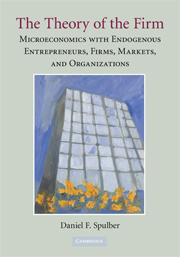 The Theory of the Firm
The Theory of the Firm Book contents
- Frontmatter
- Contents
- Preface and Acknowledgments
- Introduction
- PART I THE THEORY OF THE FIRM
- 1 The Consumer
- 2 The Firm
- 3 The Separation of Consumer Objectives and Firm Objectives
- PART II THE ENTREPRENEUR IN EQUILIBRIUM
- PART III HUMAN CAPITAL, FINANCIAL CAPITAL, AND THE ORGANIZATION OF THE FIRM
- PART IV INTERMEDIATION BY THE FIRM
- PART V MARKET MAKING BY THE FIRM
- 12 Conclusion
- References
- Author Index
- Subject Index
1 - The Consumer
Published online by Cambridge University Press: 05 June 2012
- Frontmatter
- Contents
- Preface and Acknowledgments
- Introduction
- PART I THE THEORY OF THE FIRM
- 1 The Consumer
- 2 The Firm
- 3 The Separation of Consumer Objectives and Firm Objectives
- PART II THE ENTREPRENEUR IN EQUILIBRIUM
- PART III HUMAN CAPITAL, FINANCIAL CAPITAL, AND THE ORGANIZATION OF THE FIRM
- PART IV INTERMEDIATION BY THE FIRM
- PART V MARKET MAKING BY THE FIRM
- 12 Conclusion
- References
- Author Index
- Subject Index
Summary
The main tasks of the economic theory of the firm are to determine why firms exist, how firms are established, and what functions firms perform. Firms are economic institutions whose objectives, decisions, and activities are the result of fundamental economic forces. To explain the economic role of firms, economic analysis must derive firms endogenously from initial conditions.
Take firms away from microeconomics and what is left? – consumers! This immediately suggests that the theory of the firm should begin with an economy in which there are only consumers. Starting with consumers as the givens of the model has a key implication. Consumers will establish firms if and only if doing so improves economic efficiency. The theory of the firm necessarily derives the existence of firms from fundamental assumptions about the characteristics of consumers who have exogenously given preferences and endowments. Therefore, consumers are the basic building blocks of the theory of the firm.
The purpose of this chapter is to examine the characteristics of consumers and economic interaction between consumers. Consumers are defined by their preferences and endowments. Consumers own ideas, business methods, technologies, and other intellectual property. Consumers can engage in research and development (R&D) to find new technology. Consumers own production technologies and they can act as producers by operating the production technology themselves. Consumers obtain benefits from exchange with one another and incur transaction costs.
This chapter introduces the intermediation hypothesis. Firms play an economic role when intermediated exchange is more efficient than direct exchange.
- Type
- Chapter
- Information
- The Theory of the FirmMicroeconomics with Endogenous Entrepreneurs, Firms, Markets, and Organizations, pp. 11 - 62Publisher: Cambridge University PressPrint publication year: 2009


